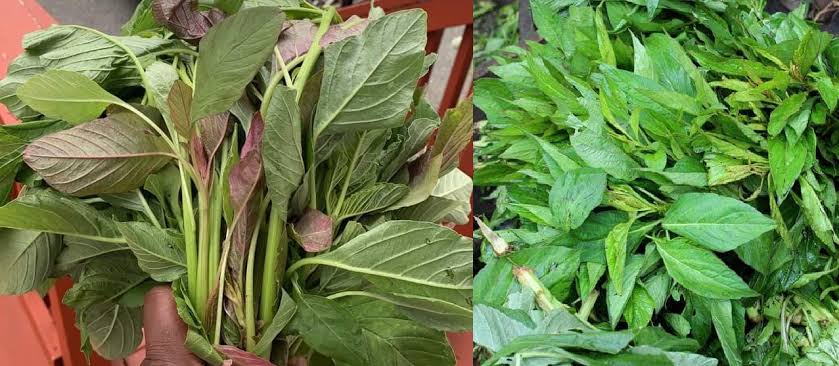Health Benefits and Uses of Efo Leaves
Efo leaves are a type of leafy vegetable commonly consumed in West Africa, particularly in Nigeria. The term “efo” refers to a variety of leafy greens, including spinach, amaranth, and other greens that are used in Nigerian cuisine. Efo leaves are usually cooked in stews and soups and are often paired with ingredients such as meat, fish, or beans.
In Nigerian cuisine, efo leaves are highly valued for their nutritional benefits, as they are rich in vitamins, minerals, and antioxidants. They are also known for their versatility in cooking, as they can be used in a variety of dishes and preparations.
Also, efo leaves are a nutritious and delicious ingredient in Nigerian cuisine and are enjoyed by many people across the region.
Read Also: How to Control Cassava Diseases and Pests
Description of Efo Leaves

Some common types of efo leaves include spinach (known as efo tete in Yoruba), amaranth (efo shoko), waterleaf (efo yanrin), and pumpkin leaf (efo elegusi).
Spinach efo leaves are usually tender and have a mild flavor, while amaranth and waterleaf leaves tend to be slightly tougher and have a more bitter taste. Pumpkin leaf efo is larger and tougher than the other types and is often used in traditional Nigerian soups and stews.
Overall, efo leaves are a nutritious and flavorful ingredient in Nigerian cuisine and are used in a variety of dishes and preparations.
Types of Efo Leaves
Spinach (Efo Tete): This is a very popular type of efo leaf that is often used in Nigerian cuisine. It has a mild flavor and a soft texture, making it easy to cook and incorporate into dishes.
Amaranth (Efo Shoko): This type of efo leaf has a slightly bitter taste and a tougher texture than spinach. It is often used in traditional Nigerian soups and stews.
Waterleaf (Efo Yanrin): Waterleaf is a tender and juicy efo leaf with a slightly sour taste. It is often used in salads and can also be cooked in soups and stews.
Bitterleaf (Efo Ewuro): As the name suggests, this efo leaf has a bitter taste and a tough texture. It is often used in soups and stews to add a bitter flavor.
Scent Leaf (Efinrin): This type of efo leaf has a strong and aromatic flavor that is often used in soups and stews. It is also used in herbal remedies due to its medicinal properties.
Pumpkin Leaf (Efo Elegusi): This efo leaf is large and has a slightly bitter taste. It is often used in traditional Nigerian soups and stews.
Each type of efo leaf has its own unique taste and texture, making them suitable for different dishes and preparations.
Health Benefits of Efo Leaves

Rich in Vitamins: Efo leaves are a rich source of vitamins A, C, and K, which are essential for maintaining healthy vision, skin, and bones.
Boosts Immunity: Efo leaves contain antioxidants that help to boost the immune system and fight off infections.
Promotes Digestion: The fiber content in efo leaves helps to promote healthy digestion and prevent constipation.
Supports Weight Loss: Efo leaves are low in calories and high in fiber, making them a great addition to a weight loss diet.
Regulates Blood Sugar: Efo leaves contain compounds that help to regulate blood sugar levels and prevent spikes in insulin.
Reduces Inflammation: The antioxidants in efo leaves help to reduce inflammation in the body, which can lead to a range of chronic diseases.
Lowers Cholesterol: Efo leaves contain compounds that help to lower LDL (bad) cholesterol levels in the blood.
Prevents Anemia: Efo leaves are a good source of iron, which is essential for preventing anemia.
Supports Heart Health: The fiber, antioxidants, and other nutrients in efo leaves help to support heart health and reduce the risk of heart disease.
Boosts Brain Function: Efo leaves contain compounds that help to improve cognitive function and memory.
Promotes Healthy Skin: The vitamin A in efo leaves helps to promote healthy skin by supporting cell growth and repair.
Prevents Cancer: Efo leaves contain compounds that help to prevent the growth and spread of cancer cells.
Reduces Risk of Osteoporosis: The vitamin K in efo leaves helps to support bone health and reduce the risk of osteoporosis.
Supports Eye Health: The vitamin A in efo leaves helps to maintain healthy vision and prevent eye diseases.
Reduces Anxiety: Efo leaves contain compounds that help to reduce anxiety and promote relaxation.
Prevents Asthma: Efo leaves contain compounds that help to reduce inflammation in the lungs and prevent asthma attacks.
Regulates Blood Pressure: The potassium in efo leaves helps to regulate blood pressure and prevent hypertension.
Reduces the Risk of Stroke: The antioxidants in efo leaves help to prevent the formation of blood clots that can lead to stroke.
Promotes Hair Growth: The vitamin A in efo leaves helps to promote healthy hair growth and prevent hair loss.
In addition, efo leaves are a highly nutritious and beneficial addition to a healthy diet.
Read Also: Health Benefits and Uses of Kpomo
Uses of Efo Leaves

Soups and Stews: Efo leaves are often used in traditional Nigerian soups and stews, such as egusi soup, vegetable soup, and pepper soup. They add flavor, nutrients, and texture to these dishes.
Salads: Some types of efo leaves, such as waterleaf and spinach, can be used in salads. They add a fresh and crunchy texture to the salad and provide important vitamins and minerals.
Side dishes: Efo leaves can also be used as a side dish to accompany a main meal. They can be sautéed with spices, garlic, and onions for added flavor.
Smoothies and Juices: Efo leaves can be added to smoothies and juices for a nutrient boost. They add a mild flavor and provide vitamins and minerals.
Wraps: Efo leaves can be used as a wrap for rice, beans, or other fillings. This is a healthy and low-carb alternative to tortillas or bread.
Medicinal purposes: Some types of efo leaves, such as scent leaf, are used in traditional medicine to treat various ailments such as headaches, stomachaches, and fever.
Additionally, efo leaves are a versatile and nutritious ingredient that can be used in a variety of dishes and preparations. They add flavor, texture, and important nutrients to meals, making them a valuable addition to a healthy diet.
Nutritional Value of Efo Leaves

High in fiber: Efo leaves are an excellent source of dietary fiber, which can help promote digestive health and prevent constipation.
Rich in vitamins and minerals: Efo leaves are a good source of vitamins A, C, and K, as well as minerals such as iron, calcium, and potassium.
Antioxidant properties: Efo leaves contain antioxidants such as flavonoids and carotenoids, which can help protect your cells from damage caused by free radicals.
Low in calories: Efo leaves are a low-calorie food, making them an excellent choice for people looking to manage their weight.
May have anti-inflammatory properties: Some studies suggest that efo leaves may have anti-inflammatory properties, which can help reduce inflammation in the body.
However,efo leaves are a healthy addition to any diet, and incorporating them into your meals can provide you with a range of health benefits.
Read Also: 7 Healthy Drinks for Kids (And 3 Unhealthy Ones)









